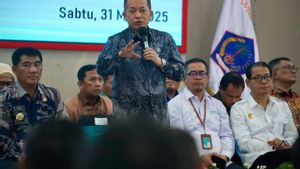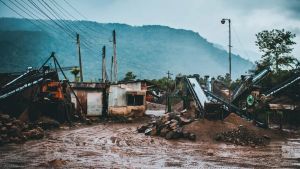JAKARTA - A geneticist from IPB University, Prof. Ronny Rachman Noor, highlighted the phenomenon of COVID-19 being able to infect animals, although there is no evidence that animals play an important role in spreading the disease to humans.
"However, data in the field shows that there has been transmission of COVID-19 in various species around the world such as dogs, cats, monkeys, and minks (mink)," said Ronny in a statement from IPB University received by Antara, Sunday.
The Professor of the Faculty of Animal Science, IPB, explained that cases of transmission of COVID-19 to cats and dogs have been reported in several countries, such as transmission to dogs in Hong Kong and cats that tested positive for COVID-19 in England.
In addition, there were also cases of COVID-19 in tigers at the Bronx Zoo in New York, United States. With the recent case being eight gorillas at the San Diego Zoo, California, USA also testing positive for COVID-19 presumably due to exposure to guards infected with the disease.
"A more serious problem occurs with mink, which is a semi-aquatic animal that is bred for its fur. Several countries have reported infections in mink and in some cases, it is very severe and has died," he said.
The largest number of infections in mink occurred in Denmark which led the country to take the decision to culminate millions of animals and shut down the mink farming industry completely until 2022.
The most worrying thing, explained Ronny, is the evidence that the mink has transmitted the virus back to humans. From various cases that have been reported, this transmission is thought to have occurred from humans to pets, but if in the future there is re-transmission from animals to humans with mutated variants of the virus, the pandemic will be increasingly difficult to control.
The spread of the COVID-19 virus, which is not impossible, also gives a red light for threatened animals such as gorillas and other endangered animals, because it can make animals that are already endangered even more threatened.
In addition, there are concerns that if the virus spreads to animals, mutated variants will appear.
The fear of re-transmission from animals to humans with viruses that have undergone mutations has led to the idea that a special COVID-19 vaccine for animals is needed.
This is needed not only to break the chain of transmission between humans to animals and between animals but also to anticipate transmission back from animals to humans.
"Russia is listed as the first country in the world to successfully develop and produce a COVID-19 vaccine specifically for animals and has been approved for use this month. The vaccine produced by Russia is called Carnivak-Cov which can be used on dogs, cats, minks, foxes, and other animals," he said.
SEE ALSO:
The results of clinical trials of the vaccine were carried out in October last year and produced 100% antibodies in all vaccinated animals. A special type of vaccine for animals has also been developed by the American pharmaceutical company, Zoetis, since last year.
The vaccine is considered safe and effective against cats and dogs and has been tested for gorillas and trials on orangutans and bonobos did not cause negative reactions and will be tested for antibodies soon.
"As is the case in humans, while waiting for the development of vaccines specifically for animals, health protocols must also be applied if we are in close proximity to animals. This is needed to reduce transmission both from humans to pets and wild animals or vice versa transmission from animals to humans," he said.
For dogs, if they have to go out they can walk around the house and reduce the frequency. And if you go out, it must be adjusted by keeping your distance when meeting other people.
For cats, Ronny advises staying indoors by only occasionally going out of the house and trying not to interact with other cats.
"In addition, we also have to regularly clean the food and drink containers every day, as well as the dirt. When cleaning this equipment, use a mask and wash your hands using soap containing disinfectant after washing. Another thing that must also be considered is if we are sick, we limit contact with our pets," said Ronny.
The English, Chinese, Japanese, Arabic, and French versions are automatically generated by the AI. So there may still be inaccuracies in translating, please always see Indonesian as our main language. (system supported by DigitalSiber.id)

















